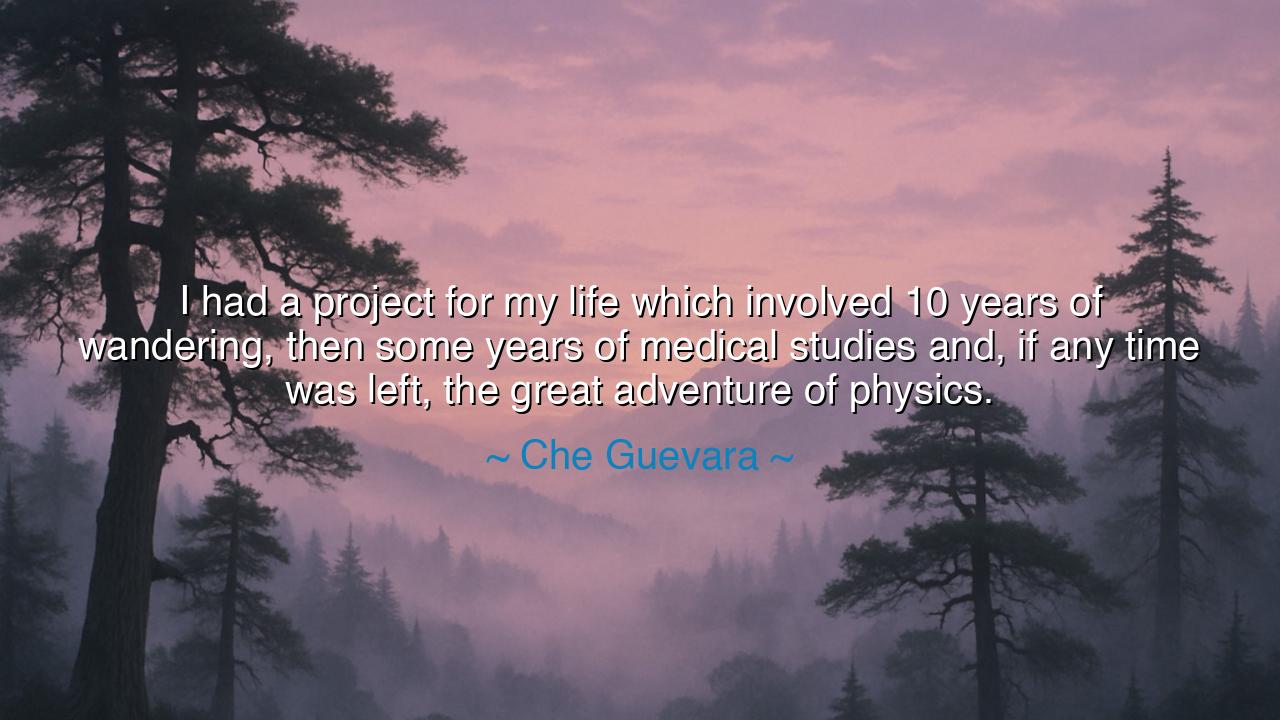
I had a project for my life which involved 10 years of wandering
I had a project for my life which involved 10 years of wandering, then some years of medical studies and, if any time was left, the great adventure of physics.






In the words of Che Guevara, "I had a project for my life which involved 10 years of wandering, then some years of medical studies and, if any time was left, the great adventure of physics." These words reflect a man deeply in touch with his own journey and the pursuit of knowledge and purpose. Guevara, a man of passion and action, speaks not just of a life path but of a quest—a path that intertwined the physical world with the intellectual, a journey marked by wandering, learning, and ultimately, seeking something greater. Guevara’s journey was not simply a series of events but a profound exploration into the depths of human experience, a reflection of his soul’s desire for understanding and change.
The ancients understood the value of the journey—not just as a physical movement, but as a spiritual quest. In the writings of Homer, the epic tale of Odysseus's journey is not only about a man trying to return home but about the wisdom gained through the trials he faces. Odysseus wandered the world, encountering various challenges and adversaries, yet each trial brought him closer to understanding his purpose. Similarly, Guevara’s wandering was not aimless but a deliberate exploration of the world and its people—a search for truth and understanding, just as Odysseus searched for the meaning of his life. Guevara took to the road, both literally and metaphorically, to shape his vision of the world.
Consider also the ancient figure of Socrates, whose quest for knowledge was not one of comfort or convention. Socrates wandered through the streets of Athens, questioning the status quo, challenging the beliefs of the time, and seeking deeper truths that most others were too comfortable to pursue. His philosophical wandering led him to understand that true wisdom lay in the pursuit itself—the continuous questioning and seeking, not necessarily finding answers. Guevara, too, shared this spirit of inquiry—though his journey took him through the landscapes of medical studies and politics, it was driven by the same desire to understand, not just the world, but the forces that shaped it.
However, Guevara’s path was not just about intellectual discovery but also a physical and existential confrontation with the world. His years of medical studies were a means to an end, equipping him with the knowledge to understand the human body—yet even in this pursuit, he sought something larger: to serve the oppressed, to use his skills not just for personal gain, but for the betterment of others. The ancients, particularly the Hippocrates, emphasized the importance of medicine in alleviating human suffering, but they also recognized that it was not the study of the body alone that mattered—it was the wisdom to use that knowledge for a greater good. Just as Hippocrates believed that a physician must balance knowledge with compassion, so too did Guevara see his medical knowledge as a tool for larger, global change.
But Guevara’s vision expanded beyond the human body to the cosmic realms of understanding, as indicated by his mention of the "great adventure of physics." Physics, in its pursuit of understanding the natural world and the forces that govern it, mirrors the ancient pursuit of wisdom in the realms of nature and the cosmos. Aristotle, who was both a philosopher and a scientist, sought to understand not only the human soul but also the natural world. For him, physics was a way to understand the workings of the universe, to uncover the truth about the world around him. Guevara’s interest in physics speaks to this same desire to understand the fundamental forces of life, much as the ancients did when they looked to the heavens and the earth to find deeper truths.
The lesson here is one of continuous learning, searching, and growth. Guevara’s journey, with its combination of wandering, medical study, and the pursuit of physics, reminds us that the search for knowledge and truth is not linear—it is a lifelong adventure, one that can take many forms and must be followed with an open heart and mind. Just as Socrates wandered the streets of Athens, not looking for certainty but for truth, so too must we be willing to take journeys in our lives that may lead us through many paths—through intellectual discovery, personal struggle, and service to others.
In our own lives, we must remember that every journey, whether of the body, mind, or spirit, is a chance to grow and evolve. Like Guevara, we may find ourselves drawn to wandering or learning, compelled by a desire to understand both the inner world and the external world. Our studies, whether in medicine, science, or art, should always be a means to a greater end—using knowledge not only for personal fulfillment but for the betterment of others. Like the ancients, we must remember that true wisdom lies not in the destination, but in the journey itself—the continual pursuit of understanding, humility, and change. Let us live with the spirit of Guevara, embracing the adventure of life, and dedicating ourselves to learning, growing, and serving with a heart full of purpose.






AAdministratorAdministrator
Welcome, honored guests. Please leave a comment, we will respond soon